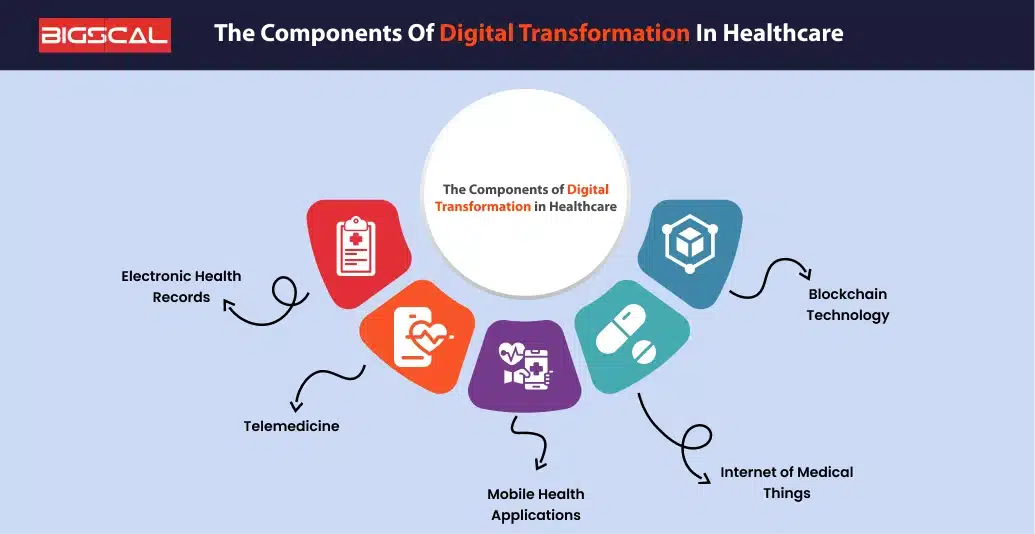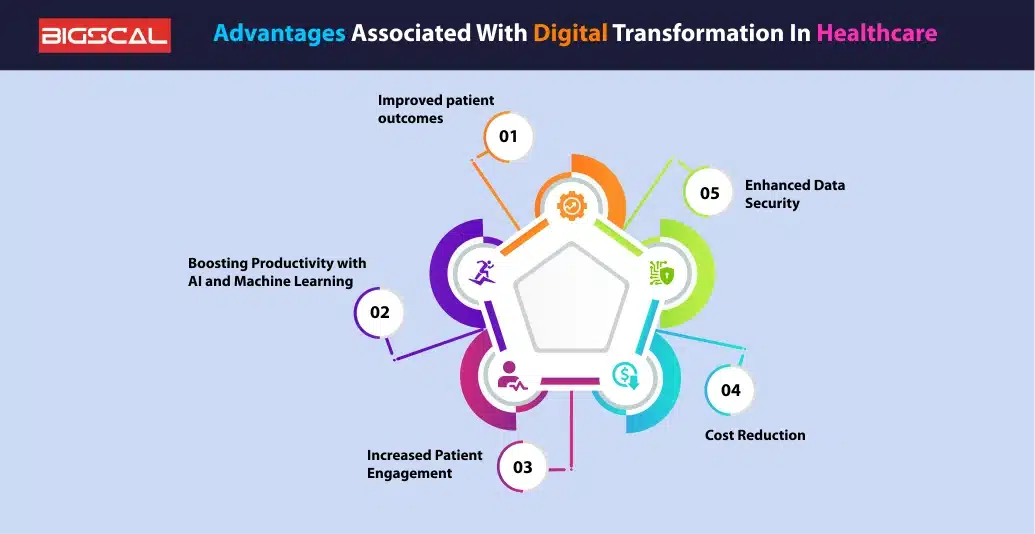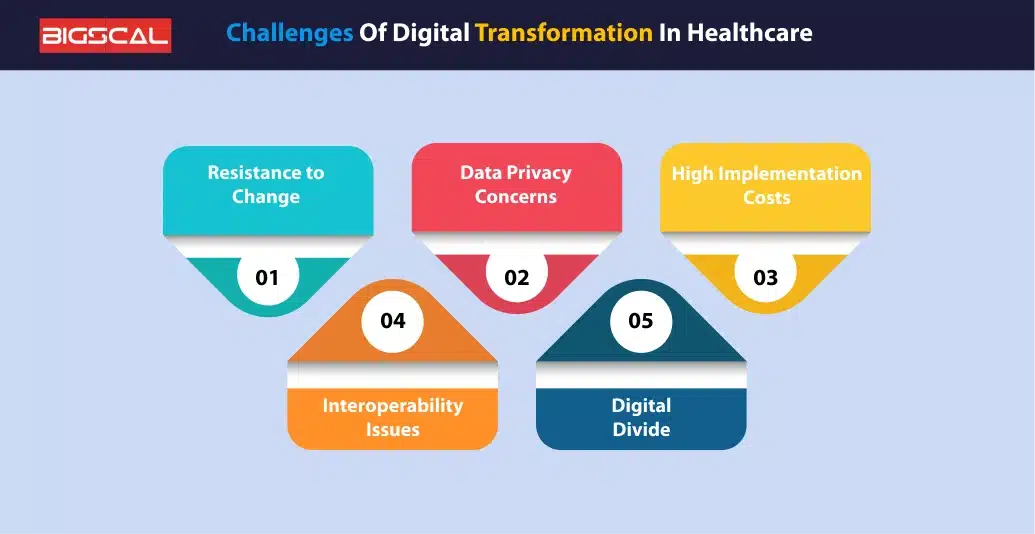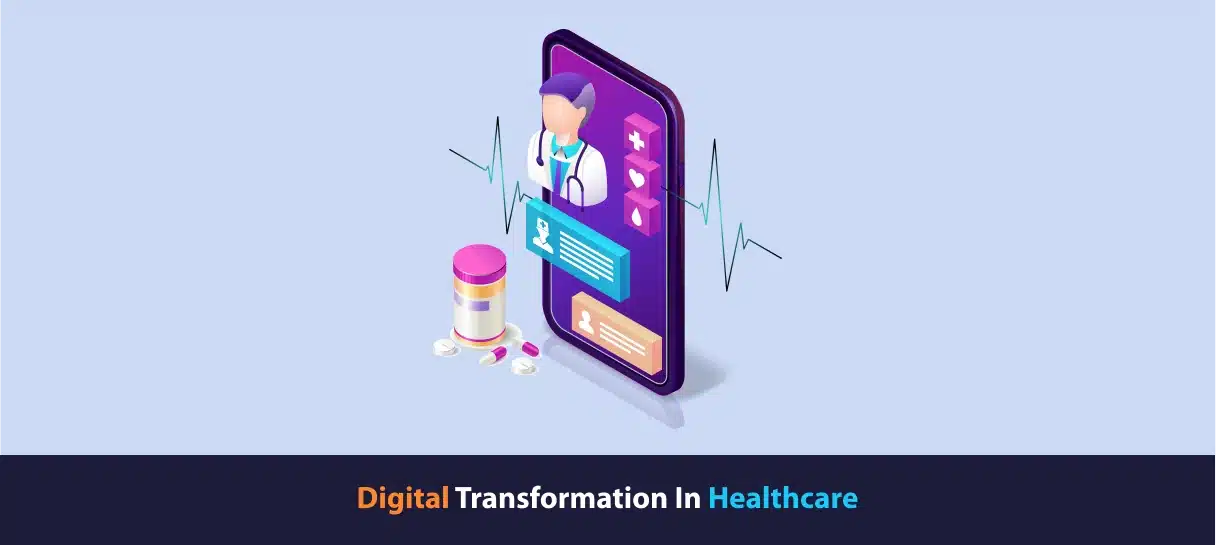Digital Transformation in Healthcare
Quick Summary: Introducing digital technology in healthcare ensures digital transformation, which has an enormous effect on service delivery and patient experience. Healthcare digital transformation amplifies the quality of patient care, simplifies operational processes, and promotes better healthcare results via data-based judgments, improved patient service, and better technological offerings. Telemedicine, which encompasses electronic health records (EHRs) and other digital tools, is essential rather than an option for digital healthcare transformation.
Introduction
Over the last few years, digital transformation has turned into a popular phrase across many sectors, but its influence in healthcare is remarkably significant. As expectations of patients grow and the demand for operational efficiency in healthcare is imminent, digital transformation has become an important pathway to improve the quality of care and operational efficiency.
The Components of Digital Transformation in Healthcare

Healthcare’s digital transformation includes several essential elements or components that include:
Electronic Health Records (EHR)
It is the task of EHR systems to change patient records into digital representations so healthcare organizations can share and analyze patient data with greater ease. The results of EHR produce better-educated choices, refined coordination of care, and a reduced occurrence of medical mistakes or errors.
Telemedicine
Through remote communication with telemedicine, patients can participate in consultations with healthcare providers that break through geographical barriers. Telemedicine boosts access to medical care for people in rural locations, as well as enhances the success of healthcare delivery by trimming down wait times and increasing the abilities of medical specialists.
Mobile Health Applications
Health applications designed for smartphones allow patients to manage their health remarkably well. These tools furnish tools for the persistent monitoring of health problems, reminders to take medicine, as well as educational content that enhances broader patient compliance with treatment approaches.
Internet of Medical Things (IoMT)
The Internet of Medical Things (IoMT) is the app-enabled network of connected devices that gathers and transmits health data. Everything from wearables, including fitness trackers, to remote monitoring systems that look after chronic health problems leads to personalized care, falling under the umbrella of the IoMT.
Blockchain Technology
The secure and transparent data exchange among various healthcare stakeholders is aided by blockchain technology. Healthcare service suppliers/providers should elevate their ability to leverage blockchain technology.
This is the right time for the healthcare industry to take hold of blockchain possibilities, creating applications that mesh with existing systems to keep patient data up to date and accessible to authorized caregivers.
Advantages associated with Digital Transformation in Healthcare

Improved patient outcomes
Embedding digital tools makes it possible to obtain more effective diagnostics along with personal treatment approaches. Early interventions based on live data empower better health results for patients.
Enhanced Efficiency in Operations with AI and Machine Learning
The fields of diagnosis and treatment planning are undergoing a dramatic change by using AI and machine learning. Algorithms can analyze vast amounts of data to identify patterns, predict outcomes, and assist healthcare providers in making data-driven decisions, thereby resulting in enhanced patient care.
Increased Patient Engagement
Tools that exist digitally enhance the role of patients in their healthcare experiences. Patients are more likely to actively engage in their care and follow through with treatment plans due to the availability of health information and improved communication with healthcare providers.
In addition to general patient engagement, digital transformation is revolutionizing behavioral healthcare, particularly for children requiring structured therapy programs. Tools that monitor progress, manage therapy sessions, and facilitate communication between caregivers and clinicians are increasingly integrated into healthcare systems, enhancing personalized care and long-term outcomes. Platforms such as a leading ABA therapy software exemplify this integration, demonstrating how digital solutions not only improve patient engagement but also streamline clinical workflows, paving the way toward measurable cost efficiencies and operational improvements.
Cost Reduction
Digital transformation results in savings in costs by eliminating the reliance on physical infrastructure, improving operational efficiency, and cutting down on errors. Telemedicine serves as an example, by minimizing the costs of direct consultations and increasing the availability of healthcare services.
Enhanced Data Security
Digital health records bring with them the necessity for effective cyber security defenses. The use of advanced security protocols supports the defense of sensitive patient data from breaches while also adhering to the HIPAA-compliant software development standards.
Challenges of Digital Transformation in Healthcare
Despite its advantages, digital transformation in healthcare faces several obstacles or challenges that include:

Resistance to Change
Classic barriers to technology adoption among healthcare professionals consist of fears of disturbing conventional workflows and the high learning curve associated with new systems.
Data Privacy Concerns
Keeping and amassing sensitive health data generates problems concerning patient privacy. Organizations in healthcare consider the maintenance of compliance with regulations and data security as a vital priority.
High Implementation Costs
In the long term, to reap cost savings from digital transformation, an early investment in both technology and training can be quite considerable. Health providers having a more focused objective may struggle to access the resources essential for the deployment of digital solutions.
Interoperability Issues
A lot of healthcare systems employ separate technologies that fail to communicate. The patient data needs to be accessible across a variety of platforms for seamless interoperability.
Digital Divide
Unequal technology access for patients results in health delivery differences. As such, it is essential to ensure that every patient can benefit from digital health solutions, which in some cases pose a serious challenge that needs to be resolved.
Future Trends in Digital Transformation
As technology continues to evolve, several trends are likely to shape up the future of digital transformation in healthcare, such as:
Rapid Growth in the Use of AI and Big Data
The rapid growth in the use of AI and big data analytics will lead to a common pattern in predictive analytics, population health management, and personalized medicine.
Development of TeleHealth Services
Digital transformation in healthcare would include providing telehealth services, which will continue to expand across borders. By improving specialist access, healthcare specialists would be able to reduce emergency room overload.
Expansion of Wearable Technology
To collect data in real time and facilitate preventive actions, wearable devices will be essential for tracking health indicators and chronic illnesses of patients.
Enhanced cybersecurity measures
As more digital health solutions appear, the requirement for durable cyber security systems will escalate to defend patient data from evolving dangers.
Focus on patient-centric care
Service providers in healthcare will focus on patient-centric care by utilizing the latest or emerging digital technologies to enhance patients’ experiences and to empower them (patients) during their healthcare duration.
Conclusion
Digital transformation is more than a transitory trend; it constitutes a key transformational shift that will determine how healthcare systems will evolve shortly.
By embracing digital tools and technologies, healthcare service providers and hospitals can better their patient outcomes, raise operational efficiency, and satisfy the healthcare needs of their patients.
Despite the existing hurdles, the advantages of digital transformation cannot be overlooked. Digital transformation is essential in the quickly changing healthcare industry, as AI and data technologies evolve at a rapid pace.
FAQ
What does digital transformation mean in the field of health care?
The integration of digital technologies into overall healthcare processes is what we refer to as digital transformation. Digital transformation in healthcare is about improving patient care, increasing operational efficiency, and supporting superior health outcomes.
Where does telemedicine lie within the concept of digital transformation?
Telemedicine represents an important part of digital transformation, which enables patients to reach healthcare providers remotely, expanding access to care, and increasing the efficiency of medical services.
What contribution does AI make to healthcare digital transformation?
Healthcare providers can make enlightened, data-driven decisions with support from AI, which analyzes data for diagnostics, treatment planning, and personalized medicine.
What represent the primary difficulties of digital transformation in healthcare?
The primary challenges or difficulties of digital transformation in healthcare consist of pushback to change, worries about data privacy, implementation costs, issues related to interoperability, and the digital divide.
How might healthcare organizations achieve data security consistency while undergoing digital advancement?
Healthcare organizations can better protect their patients’ sensitive data during digital transformation by implementing rigorous cyber security protocols, following regulatory compliances, and performing regular audits.





